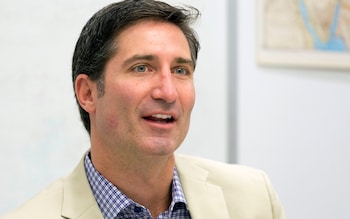Sir Keir Starmer is to consider reviving the scrapped High Speed Two (HS2) rail routes north of Birmingham after a Labour-commissioned study recommended a sweeping programme of infrastructure spending.
A report on rail by former Siemens UK boss Juergen Maier that was presented to party officials this week called for much of the HS2 network that was controversially abandoned by Rishi Sunak last October to be revived.
The report was commissioned when Labour was in opposition and is not regarded as official. However, a party source said its findings would inform decision-making as the Government carries out its own review of rail projects.
Mr Maier’s review calls for a number of big-ticket projects that are either at the planning stage, on hold or officially jettisoned to be completed.
Those include a rail route from Birmingham to Manchester – without which the West Coast Main Line and M6 motorway face “collapse” – and a new rail line from the Midlands to Leeds “now that HS2 in the North has been cancelled”.
Mr Maier also called for the completion of a link from HS2’s initial terminus at Old Oak Common in west London to Euston station.
While the report stops short of calling for a revival of HS2 outright, or the same running speeds, taken together its recommendations would amount to the same network being constructed piecemeal.
Mr Sunak scrapped the northern leg of HS2 last year after cost overruns threatened to take the total expense of the scheme beyond £100bn.
The line will also no longer be extended to Euston without private investment.
The Labour source said that when the study was first commissioned it was expected that its findings would be published before a general election, which at that point was anticipated this coming autumn.
With Labour now in power, the timing of the report is uncomfortable for ministers. Enacting Mr Maier’s plans would involve spending billions of pounds at a time when public finances are stretched.
Chancellor Rachel Reeves has ordered a comprehensive review into public spending, expected to be published next spring, after identifying what she claimed was a £22bn hole in the public finances. Some £2.9bn of that figure is related to unfunded transport commitments.
The Treasury has asked the Department for Transport (DfT) to undertake its own inhouse review of infrastructure plans. The DfT said when announcing that review that “communities up and down the country have been given hope for new transport infrastructure, with no plans or funds to deliver them”.
Transport Secretary Louise Haigh, who appointed Mr Maier to undertake his study last December, is cited in the launch of its findings as saying they will “help inform this new Government’s thinking”.
The DfT added: “The Transport Secretary has made clear her commitment to transforming Britain’s transport infrastructure and implementing the most radical overhaul of public transport in a generation.
“We welcome this report, and we will review its recommendations.”
Mr Maier’s 81-page study calls for a shift in the Government’s approach to transport infrastructure and urges Labour to “seize this moment with bold ambition and zeal”.
The British-Austrian businessman made clear following the launch that he expects major projects including those related to HS2 to be taken up.
Asked which could happen quickly, he listed the Euston link and the creation of new capacity from Birmingham to Manchester, saying that both “unfortunately were cancelled down by our last government” and would be “very complicated and difficult” to deliver.
Other proposals put forward by Mr Maier include the delivery of a new east-west route across Northern England; enhanced links between England and Scotland and between the East and West Midlands; upgrades to the East Coast Mainline from York to the northeast; a new station in Bradford; electrification of the line to Hull; and the easing of bottlenecks in central Birmingham.
The appointment of Lord Peter Hendy, a former chairman of Network Rail and a leading advocate for HS2, had already stoked industry hopes that scrapped parts of the project might be revived.
Mr Maier, who Labour last month also made chairman of GB Energy, said partnerships between the public and private sectors could ease the impact of his proposals for taxpayers.
That wouldn’t mean a revival of private finance initiatives, reviled by many in Labour. Instead the study envisages a more complex model where costs and risk are shared and companies are paid back in part through fares rather than via a fixed fee.
Project costs could be cut by 20pc and delivery times by 25pc if red tape were eliminated, according to the study, which was compiled with design-engineering firm Arup and also involved former HS2 chairman Allan Cook and the TUC’s head of economics, Nicola Smith.
Disclaimer: The copyright of this article belongs to the original author. Reposting this article is solely for the purpose of information dissemination and does not constitute any investment advice. If there is any infringement, please contact us immediately. We will make corrections or deletions as necessary. Thank you.



